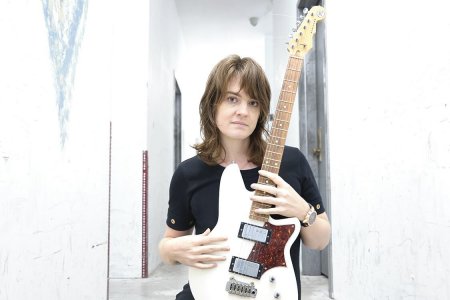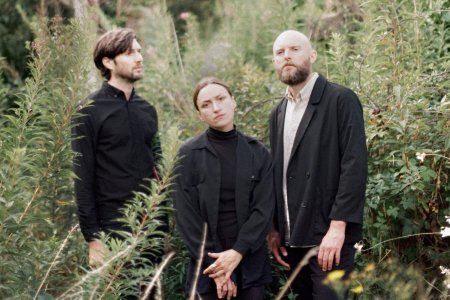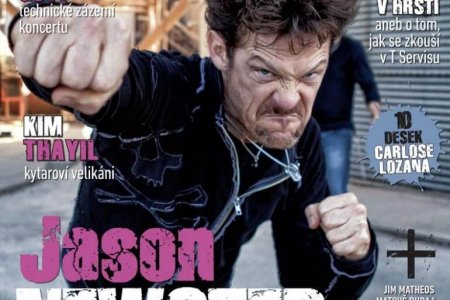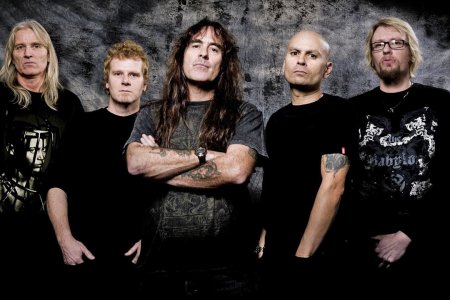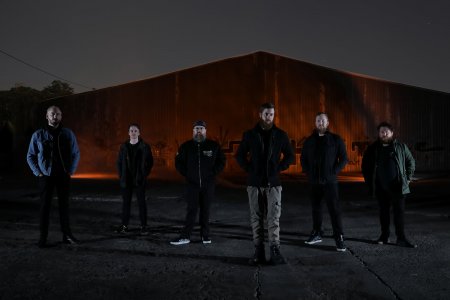In the rock music world we would not find many keyboard players with a career story, discography and a list of cooperations as of American player with Armenian roots Derek Sherinian. Main motivation for this front cover interview was naturally his new album The Phoenix, which was released nine years after its predecessor. Derek cooperated again with legendary drummer Simon Phillips, but he also invited a number of top class guests. Next to respected figures that accepted an invitation for this album, towards the end of the interview, we also spoke about other icons he cooperated with. We mentioned personalities which helped him to reach a position of a respected studio player, which is a role he is handling very well even during a pandemic.
This interview originally came out as a front cover interview in August 2021 issue of Czech magazine Muzikus.
How are you feeling lately?
Great. I am happy The Phoenix is finally out and I believe it’s my best record so far. It’s been nine years since Oceana, a lot of life has been lived and my playing has got a lot stronger. My writing, producing skills and confidence. So I could absolutely say The Phoenix has my best work.
What were you doing in the previous months to keep your head sane? Were there some activities you were pushing aside for a long time as finishing reading a book, learning a new language or anything like that?
Well, when Sons of Apollo cancelled a tour, I went right away into a studio and spent a couple of months doing overdubs. It took a lot of time to get it all done. Next to that, I’ve been doing a lot of keyboard sessions in my studio. I just played on Michael Schenker’s record two weeks ago, which will be called Immortal. Then I also played on two Whitesnake records. I re-did all the keyboards on two whole Whitesnake records for David Coverdale. And I’m doing a lot of sessions for people, unknown artists all over the world, people that love my keyboard style and want me to play on the records. They’ll email me and send me their tracks and hire me to play. I listen to the music, and if I really like it, and I feel I can help them, then I will play on their stuff. So it’s been a great side business for me. I mean, there are no tours and it’s been fantastic. If it keeps going as great as it is, I might never tour again. (Laugh)
Yoda Behind The Drums
I’m always trying to understand the chemistry between the core co-writers. As this magazine is mainly for professional musicians, please tell us something about the interaction between you and Simon.
Well, Simon has been a hero of mine since 1980, since I bought Michael Schenker’s his first album and Jeff Beck’s There and Back which both have Simon on drums. Both of those records were released one month apart. I realized Simon’s mastery, where he could play both of those styles, but you could tell his personality as soon as he hits the drums. And to me, that’s the most important aspect that a musician can have. When I first started working with Simon twenty years ago on the Inertia record, I went in there with like: “I am going to work with my hero!” And I still feel that even twenty years later, there’s always that little kid in me that has to pinch myself to remind myself: “Holy shit, you’re working with Simon Phillips!” But our relationship has moved way past that. We’ve done five records together and we co-write, and we really enjoy working together. I am very blessed. There’s so much knowledge that he has, as well as talent and I just feel very blessed to be exposed to someone as great as Simon Phillips. He has been a great friend, mentor and musical partner.
Shortly before The Phoenix, I dived deep into your older albums, where I felt, even since the Planet X that you are investing a lot in the production. In the case of The Phoenix, it has very big sound. Give us an idea please about the production, as Simon was co-producing.
Simon was involved from the beginning to end. Even on the songs that he didn’t write. And so Simon made sure that the quality of everything that we recorded was at the right levels and that the performances were all great. Like he’ll say to me: “Derek, this is recorded too loud, you have to re-do it!” or “You’re rushing on this, you need to re-play it.” You know, he can make those calls. And I am listening to everything he says. Sometimes I’ll disagree, but we did work it out. Like if he makes a suggestion that I don’t agree with, I’m not shy to stand up for myself. But a lot of times when it comes to a sound quality, or performance, I’m going to defer to Simon because he’s like Yoda. Then by the time everything’s recorded, Simon has a total control in the mixing. I listened for levels like he’ll turn it into me and I’ll say: “This needs to be louder! This needs to be louder!” Each song will go back and forth five times before it’s how I want it. But he’s just made an amazing and mixing qualities are just awesome. Listen to his drums. Just listen to when he does a top fill, listen how warm and fat those drums sounds are.
Do you once in a while go back to some of your older stuff? Let’s say Planet X sound reminded me of early Symphony X albums and I really love that unique late 90’s sound.
Yeah, there’s a coolness to it. I put on Planet X’s MoonBabies from 2002 the other day just to listen to a couple tracks and I couldn’t believe that I actually played some of that stuff. (Laugh) That’s pretty insane.

When Sons of Apollo cancelled a tour, I went right away into a studio
and spent a couple of months working on my new album.
Throughout my life I was sometimes having a hard time to properly digest certain purely instrumental albums. Mainly talking about Steve Vai or Joe Satriani’s albums. I respect the players, but sometimes, you know, it’s hard to get into it, especially if you enjoy multiple genres. But your latest album was very nicely digestible. What do you believe are the main tricks to digest an instrumental album?
The key is the writing. You have to have a great writing. And to me, the best movies and the best albums are the ones that you could, using your words, digest in one sitting. And you could listen to a record from beginning to end and not feel bored. Ideally to feel after the last note: “Wow that was amazing. I want to hear more. Let me hear it again!” You know, I think it’s important not to make a record that it’s too long. I like a 45 minute record rather than fill up a disk to 75 minutes, because I want easily digestible record. And I just spent a lot of time on the songwriting and then the next step is the choice of players.
Fellowship Of A Wizard
Talking about the guests, it’s actually quite funny that we’re having Kiko Loureiro right now on the cover in Muzikus. I’ve seen him live recently with Megadeth and he’s such an incredible talent. How did the cooperation between the two of you went?
Kiko and I have known each other for many years, but we became neighbors about five or six years ago. And last year I invited him over to the house to write and we had a really great writing session. And I wanted to feature Kiko on flamenco guitar. So we wrote a middle section where he’s featured and he sounds amazing. And I would say the song we wrote Pesadelo, is probably the heaviest song on the record.
Another really cool guest that you have is your long term buddy Joe Bonamassa. Why did you go for the Them Changes from Buddy Miles?
Well, Buddy Miles was my first professional gig in 1988. And Them Changes was his hit song. So we played that every night. Joe knew of my history with Buddy and I knew that Joe would guest on this record and sing a song. So he suggested that it would be a great song for him to sing. And I thought it was a great idea. And we made a killer video that will be coming out around the same time as the single, so I’m very glad we were able to do that song.
As this interview will be read mainly by professional musicians, I would kind of like to ask you if you could mention some of the items which you relied on the new album?
My main buddy is Hammond C3 from 1959 and I named it “Big Red”. It’s an amazing sounding organ. I have it going through Leslie 147 speaker and then amps either from Marshall or ENGL. I run it through guitar amps. It gives me that Jon Lord ballsy tone. And to me, that’s one of the major primary colors in my sound: Hammond organ, Moog piano and then my Nord through the amps. I also use very little Korg Kronos. It’s there, you know, the little touches, but not much at all. So, Hammond B3, Nord Lead 3 through the amps, and then my Moogs which I love. And then my Wurlitzer piano through the amps and then the Fender Rhodes.

My main buddy is Hammond C3 from 1959 and I named it “Big Red”.
From your earlier interviews I understood you are a person who has a clear vision about the whole process early on. How does it work it the first phases of writing? How do you organize yourself before the vision is complete?
It always starts with me collecting a bunch of ideas or sections of songs, and then bringing it up to Simon. Then once he absorbs or digests my parts, he starts writing and contributing, and then between the two of us we construct the song. But the early phases went like this. I knew Kiko was going be on the record and I was going to be writing with him so I knew I have to take care of that. Next to that I knew Joe was going to be guesting. And I knew Zakk Wylde was going to be playing, so I invited Zakk in advance. There were also piano songs Dragonfly that have no guitar. But for others I had to figure out who was going to play the guitar. The first person that I thought of was Steve Lukather, because he had played on previous records. But his schedule was super busy. It was impossible to make it work this time. So I’m going to Simon: “Who the hell are we going to get to play on these tracks?” …and then I thought of Ron “Bumblefoot” Thal. And he came in and he really put on a new twist on this music that I wasn’t expecting. Simon was extremely impressed with Ron’s playing as well. And so I think that it worked out great. I will have some surprises for the next record.
Next Album In Less Than Nine Years
Any names that you’re still dreaming about for the future?
Well, one of the names I did dream about and it’s gonna be a dream come true is Michael Schenker. He invited me to play on his record about a month ago. He was so happy with my performance that he asked through his manager: “How much do we owe you?” I said: “I don’t want any money. I just want Michael to play on my next solo record.” The manager says: “Done deal.” So I wrote a song already for Michael and recorded it with Simon and Tony Franklin. I’ve sent it to Germany and Michael is supposedly going to be doing his part this week. This song is for my next solo album and it’ll be sitting in the vaults for a year, or whatever, but I’m already starting to work on it.
Do you do hope that the next album will come out within the two or three years’ time?
Oh, absolutely. I’d say it’s gonna be in the next 18 months.
When we were today already talking about a sound spectrum in your discography, in all of those albums, I have a feeling that you have a great taste for mystique, epic sound. Can we in some way connect it to your childhood fantasies, fascinations, books or movie soundtracks that you always loved?
I don’t know. But I would say that the movie soundtrack that influenced me the most of my music is Planet of the Apes. I love the work of Jerry Goldsmith and I feel he was really close to progressive rock and reminded me of bands like Emerson, Lake and Palmer, which I think were influenced by him. So a lot of different things, but yeah, I would say Planet of the Apes.
How about now during the pandemic, were you spending some of the evenings watching some movies that mean a lot to you? Personally when there were really the toughest days, I concentrated on my most favorite movies rather than watching too much news.
Yeah, I just locked myself in my studio to write and play. That’s my place.
Okay, so there are no tricks for you to recharge your batteries. Its music and then falling asleep.
Yeah, music and I like to swim and exercise to keep my mind sane.
VIP Department
As you cooperated with some incredible names, I would just like to kindly ask you for some memories on a few names if you’re okay with that?
Yes, please.
I spoke twice to Marco Mendoza and he was always such a nice and a friendly guy. It always surprises me throughout the years on how many albums he cooperated including solo albums of Dolores O’Riordan from The Cranberries.
I love Marco. I’ve known him many years here in Los Angeles. And the first time we played together was on the John Sykes tour of Japan in 1994. And then Marco guested in 2004 for the Whitesnake. Then he also guested on my solo record Mythology in 2006. And we’ve just been, you know, great friends over the years. He’s such a fun guy. Great attitude and very, very great player. I love Marco.
When you’re talking about attitude, I must say that when I met personally Yngwie Malmsteen he proved to be very unique. I just love when he’s getting interviewed by somebody and he says stuff like: “How can less be more? More is more!” Plus the way he interacted with Glenn Hughes in London at Marshall’s 50th anniversary show, it was one of the best things I’ve seen in my life.
He’s been a big hero of mine ever since I went to Berkeley. I’ll tell you, he’s just probably one of the greatest I’ve played with on a rock guitar. When you’re sitting across from him and he has his guitar on, through Marshalls, it’s like playing with Thor or Loki. You know guys like Zakk or Yngwie, they are larger than life. And Yngwie is one of the greats. He’s special and I feel honored to have played with him and a lot of Yngwie has come through my DNA in my playing as well. There’s a certain attitude, a certain fire. There’s a certain “Fuck-Youness” when he plays. That to me, I think that’s what it’s all about. It’s total conviction. You don’t question it. And that’s how I want to be on my keyboards.

I believe “Fuck-Youness” also fits for Billy Idol.
Yeah, that’s it. It’s an attitude in the playing and it’s totally in my keyboard playing. If you listen to the very first song of The Phoenix where it just starts with my keyboard. That’s me raising my middle finger.
Time to move to Czech Republic. I know that within the list of your inspirational figures is Jan Hammer. In what way did he fascinate you?
He was the first keyboard player that I heard that played with some originality on synths. I first heard him on the Jeff Beck records and then with Mahavishnu Orchestra and Al Di Meola. He was like my hero on synths for many years, and to this day, I think that he’s one of the greats. Jan Hammer is awesome. Big influence on me. The pitch bending, running of the keyboards through the amps, the guitaristic approach to soloing. I mean, all of that stuff that I do, a lot of it was influenced by Jan Hammer
Another name you already mentioned was Jeff Beck. I believe you never go wrong with buying somebody Truth from 1968. But I can imagine within his discography, there are more albums that you love.
Oh, my three favorite are Wired, Blow by Blow and There & Back, the record that Simon played on. Those are the big three for me. Yeah.
Jeff Beck stays as a big inspiration, but you managed to play with Eddie Van Halen. You often mention to be influenced by guitarists in the way you play keyboards. Therefore I am interested to know, if you enjoyed the way Eddie played keyboards in the Van Halen’s track Jump?
I didn’t like it. I didn’t like it at all! But I mean, I like the way he plays keyboards on some things. There is some clever stuff. But in general I want to see Eddie van Halen playing guitar. I don’t want to see him play keyboards. But he should be able to play whatever he wanted, at the time.
In 2018, when I joined a team of Czech TV Seznam, I had big honor to have the first interview with Glenn Hughes. I have massive respect for him, he was very friendly and I must say that in his age, he still has an incredible voice.
We started playing together in 2009 with Black Country Communion, and we’ve done four records together and many, many shows. And he’s just a rock legend. You know, he’s one of the original “guys” from the 70s. And it’s always great to be exposed to these guys because they’ve seen rock and roll. They’ve been around and there’s so much to learn, playing wise and from knowledge.

Any talks about the fifth album?
Yes, we’ve talked about it. We’re gonna do it next year. We just have to figure out a time, but it’s going to happen.
Another name which helped me a lot in the early TV days, was an interview with Slash. Regulations were insane but we had a great chat about life, Black Sabbath and other things. So what about you and your memories on Slash?
He came over and played on my record Blood of the Snake. In the summertime, he’s been in my house a couple of times and I thought he was a really nice guy and he was kind enough to come to do the video with Billy Idol. I have really great memories of Slash.

One name which really helped you in the early days was Alice Cooper. I saw a number of music documentaries with him and he always seemed as a very, very unique personality which has thousands of stories and thousands of inspirational things to say. So please tell us your memories on your early days and the first chance you got from Alice Cooper.
It was very exciting for me when I started playing with Alice in 1989. That was my very first big gig, touring the world nad being on MTV. What a great first boss to have and be exposed to just very nice, very cool guy. Very great sense of humor. And again, he’s been through it all. With guys like this as Alice, Kiss and Glenn Hughes you want to listen when they speak, because they’ve lived it. There’s so much that they’ve seen and there’s a lot of knowledge there. But Alice is great. He gave me my first big break in the business and I’ll always be grateful for that.
And the last thing, last name I would like to kindly ask you for a memory is Eric Singer from Kiss.
Eric is to this day one of my best friends in the world and I love him. He’s like a big brother I never had. I think he’s an amazing drummer. And I’m so proud of him that he’s got to play with Kiss, made all that money, became a huge rock star and God bless him. It couldn’t be for a better person.

